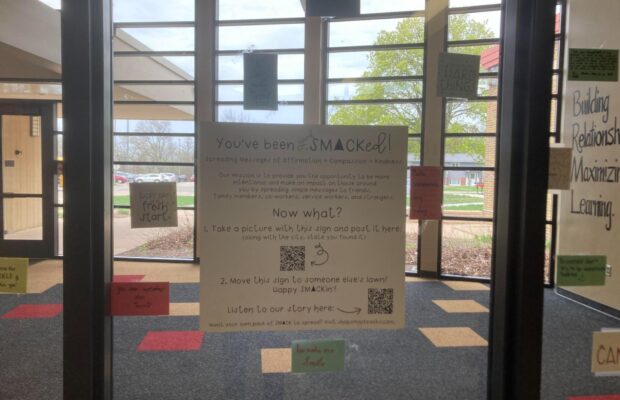CF staff react to lessons of ‘Gifted’
 The recently released movie, “Gifted,”opens a lot of questions about the potential connections with gifted students in Cedar Falls Schools. The movie features a seven-year-old girl with a mind like a calculator. Her uncle just wants to give her the normal life of a young girl to fulfill his sister’s last wishes. With pressure around him to put her in accelerated classes, he struggles to wrap his mind around what this could do to her social life at a such a young age. So, it raises the question, what would Cedar Falls do in this situation?
The recently released movie, “Gifted,”opens a lot of questions about the potential connections with gifted students in Cedar Falls Schools. The movie features a seven-year-old girl with a mind like a calculator. Her uncle just wants to give her the normal life of a young girl to fulfill his sister’s last wishes. With pressure around him to put her in accelerated classes, he struggles to wrap his mind around what this could do to her social life at a such a young age. So, it raises the question, what would Cedar Falls do in this situation?
Regarding gifted programs, Peet Junior High Principal Bill Boevers said that being accelerated really depends on the maturity level of the student. “I like the idea of balance for a student. If they are able to be accelerated and want to be pushed, I am in favor of it. Students are individuals, and some can handle acceleration better than others regarding social and emotional adjustments. There could be two students with the same data points suggesting they are ready academically, but acceleration for one might be much better than for the other based on their maturity level,” Boevers said.
Even though he said he thinks it’s important to push students to their highest potential, he said one also needs to remember that they are still kids. “I worry about students being placed in classes where they are chronologically many years behind the other classmates. Some are able to handle this, but some are not. We need to develop kids academically, but also socially and emotionally,” Boevers said.
Holmes Junior High Principal Jeremy Jones said he understands that there needs to be a balance between work and play, that educators need to let students learn at a high level but also make sure they are enjoying hanging out with kids their own age. “All of these situations related to grade acceleration are very contextual in nature and depend on the needs and ability of the student involved. As a result, it is very difficult to generalize for all students who may be in this situation. In general, as a professional and parent, I would want to see a balance of meeting the student’s academic needs with their social/emotional needs. That really means I would be supportive of accelerating the student in academic areas that are strengths and where he/she needs challenges to continue to grow as a student while also providing opportunities to socialize with same age peers,” Jones said.
Jones said that the Cedar Falls Community School District seeks to let children in junior high accelerate in honors classes that may be at the high school, but also be sure they aren’t depriving students of the social aspects of junior high. “We often try to do that at the junior high level in Cedar Falls by accelerating in strength areas through honors level courses and/or sending students to the high school to meet their academic needs. At the same time, most of their day is still spent at the junior high for social purposes and to participate in any activities that they may be involved with,” Jones said.
CFHS Principal Jason Wedgbury said he thinks about the various sides to this issue when considering this topic. “I consider talent, ability, passion, socialization, life experiences, etc. as I look at this situation,” Wedgbury said. Wedgbury said he agrees more with the student’s needs and goals rather than the parents when put in this sort of predicament. “What drives the student versus what drives the adults. I am resistant when it is the adults who are pushing readiness. However, I prefer to support passion and areas of interest. If she is driven by high levels of learning in an area, then don’t bore her in classes beneath her ability and interest,” Wedgbury said.
Wedgbury further backed up his beliefs that the student’s passion for learning should be the reason to accelerate him/her in a course. “I am on the side of some advanced courses if the student is passionate and driven. If it is the adults pushing her ability because they think she is capable of more, I would probably push back on the idea,” Wedgbury said.
Another factor not discussed widely is how a student of such a young age in an older class would impact her peers. “I have witnessed students in similar situations interact very appropriately with a significant age difference and the older students be accepting of the younger student learning with them,” Wedgbury said.
Boevers referred to his thoughts on the character from the movie when voicing his opinion. “If she were stronger academically, she could be a little intimidating, but I think most would work harder and compete with the younger student.”
Every situation is different at every school and varies for every child. The principals at the junior highs and high school all agree that they just want what’s best for the students here. “Balance is what my mind centers around. I support following areas of passion but allowing developmental growth from the social/emotional aspect and the ability to enjoy life experiences,” Wedgbury said.
Peet ELP teacher Sarah Cooper agreed with Wedgbury that the most important thing is balance. “I think there’s a balance. There are so many factors to consider — what does the child want? Is the current school able to provide the ‘push’ the child needs? Some teachers would be very comfortable with having a child this exceptional in their classroom, but some might struggle,” Cooper said.
She also agrees that their isn’t a clear answer in what to do in this situation. “My personal and professional belief is that there is no ‘across the board’ cookie cutter answer in situations like this. Each child, whether receiving special services or in all general education classes, has different needs. If the child needs special classes, then it’s appropriate. Some kids and parents, though, desire for their kids to stay with their age mates. That’s OK, too,” Cooper said.
Cooper really focused on the social aspect of it all. Given a certain talent or ability, you need to know how each child will react around their peers. “Some kids are outgoing, some are not. Some kids gloat about their abilities, some don’t. Some kids help others around them, some don’t. It’s the same with kids of all abilities in all areas. Some will use it as a positive and relate well with their peers. Some won’t,” she said.
Cooper said lot of people worry about what may happen to a child and what they’re missing out on if accelerated at an extreme level, “but you have to remember that sometimes these kiddos don’t have the same interests as their age mates. They don’t want to do the things that other kids their age want to do. No kid is identical to another. Parents and educators need to be sensitive to their kiddos and see them all as individuals and recognize that what was right for one child might not be the right thing for another, even in the same family.”
Both Holmes ELP teacher Karen Newcomb and CFHS ELP teacher Tim Kangas discussed a publication called “A Nation Deceived: How Schools Hold Back America’s Brightest Students” when addressing their beliefs on this topic.
Newcomb explained that this selection talks about the acceleration process and the many ways to accelerate a child. “Our society is pretty good at helping meet kids’ needs when they’re gifted musically or athletically. We get them the support and instruction that their abilities require, not what someone once decided a kid their age should get. We’ve got a long way to go as a society to see that happen regularly in academics,” Newcomb said.
Newcomb said that there are many ways to accelerate a student’s learning, but it may be hard to tell which way is best for that individual. “At the same time, determining who needs whole-grade acceleration and whose needs can be served by enrichment or differentiation within the classroom is a harder line to draw. Some kids are a little more advanced than their peers academically, and a very few kids are truly head-and-shoulders more advanced. There’s definitely a difference in how to best serve those kids, and there are also a lot of different ways to accelerate a student,” Newcomb said.
Kangas said he is definitely in favor of acceleration if all of the right components are there. “That really is the key. The conditions need to be right: from the child’s readiness; the support of parents, teachers and administration; the peers and the material itself. As long as everything is in order, acceleration is generally appropriate and successful. Unfortunately, there are times where the support is not there or the conditions are not right, and those times seem to be what drives a lot of the hesitancy,” Kangas said.
Many people worry about age difference and the effect that has on the child, but Kangas doesn’t believe that is much of an issue. “Studies have shown that there are significant differences in age peer and ability peer groupings. Students generally show greater success when they are paired with like-ability students rather than like-age students. The age difference is often imperceptible when they are functioning at the same ability level. Even in cases of extreme age difference (i.e. 8-10 year olds with high school students), the difference is overcome once there is understanding of the ability,” Kangas said.
Newcomb heavily agreed with Kangas on this topic. “Kids also need peers who are developmentally ready for the same kind of play as they are. Oftentimes that means same-age peers, but certainly not always. Most of us had younger or older neighborhood playmates who we enjoyed just as much or maybe even more than the kids who were our own age. But again, we also need people who we can talk about our unusual interests with,” Newcomb said. “While older kids may think it’s ‘odd’ at first to see a younger or much younger student in their class, it quickly becomes normal and most have no problem with it.”
Every educator just wants what’s best for their students, and if acceleration seems like the right route, it’s most likely meant to be. “If it’s appropriate and necessary for the child, I am fully in support of acceleration of whatever type needed,” Newcomb said. “In our school district, which is probably true in most districts, we do a lot more single-subject acceleration (math at the elementary level, and a variety of core subjects at the secondary level) than whole-grade acceleration. And certainly, a child as gifted as the one in this movie appears to be, is extremely rare. I’ve never worked with a student that exceptional, but they do exist — and not just in the movies But when situations come up and a student clearly does not belong in the grade he or she is presently in, then we need to consider a variety of data and make the decision that is best for the child. If the student clearly needs it and desires it, then it probably needs to be done.”









You must be logged in to post a comment Login